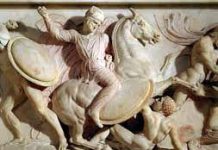Idwar al-Kharrat | At the Theatre | An Analytical Study
–Menonim Menonimus
Idwar al-Kharrat | At the Theatre | An Analytical Study
Idwar al-Kharrat | At the Theatre | An Analytical Study
At the Theatre’ is an Arabic short story written by Idwar al-Kharrat (1926- ….), a Greek novelist, story-teller, essayist and critic. The story has no plot but only characterization. The main theme of the story is death and feeling of loneliness.
The story, from the very beginning to the end, keeps its readers curious which has not been quenched till the end. The story is written in the first person. The author narrates that one night he was in Opera Square which looked magnificent. People gathered there in large numbers. The director of Opera Square came to the front stage and announced:
“Ladies and gentlemen, it is with much regret that I have announced … I have to say … announce … I have some very sad news …”
Then the heavy gilt embroidered curtain opened with a soft, audible metallic sound. At that moment the author saw all the actresses, who had lined up on the stage in a single row, with the actors behind them in a second row. The actresses’ stage clothes were thick and dignified, old-fashioned; they appeared to be brand new, as though they had never been worn before. The multi-coloured blue, green and purple glistening, heavy, puffed up and riddled with pleats and embroidery looked stiff. They were all silent solemnly standing, motionless. An expectant silence descended upon the theatre.
Then a tall woman with powerful charisma emerged from the row of actresses. She moved toward the microphone. It was as though the director had disappeared, yet he had, in fact only taken one step back. She paused a moment and then said:
“Ladies and gentlemen … It pains me to stand here in front of you in this hallowed place and announce to you the demise of a magnificent flower of the theatre, a star of the art, our dazzling … and brilliant actress …”
From the announcement, we come to know that a popular actress in Egypt died suddenly. But the author has mentioned her name nowhere in the story. We know that the author was well acquainted with the actress and he praised her much for her career.
With the announcement, the author seemed to be lost within himself. He began to feel loneliness. He could not believe that an actress like the one whom he praised would die. He began to see daydream of her. The author thought that she was standing there alone. She was gazing at the author. He noticed that it was as though the shadow of a smile was engraved on her lips. He thought that she would be in great pain, not of her doing and not for herself, but for the author.
He felt as if all were a dream for him. Thus the story comes to the end.
In the story, we see that the author’s emotional state of mind revolves round the dead actress and he feels lonely though he was among the crowd of people.
The story is written in an autobiographical style as the author narrates his story in the first person.
The story has no construction as it bears no plot at all. The story has neither a beginning nor an end but only curiosity from the opening to the closing of it.
The Setting of the story seems realistic and fascinating. The author gives a vivid picture of the theatre hall:
“The marble staircase and the ancient iron gate glistened, while the red carpets muffled all sounds. ………… The murmur of the voice, the moment of the feet and the peaceful hubbub rose up to me from the hall, studded with turning lights. The red, plush velvet they lit up added to the impression of luxury. Then the three knocks came; the lights were dimmed, and the din and hum gradually died down.”
The dialogues used in the story suit the purpose of the author as they have expressed the inner and outer motives of the characters. The dialogues are simple and direct. For example, we can quote the following imaginary conversation between the author and the actress:
I said: What caused you pain?
She said: An unresolved crisis in the soul has consumed me with grief and sorrow …pride stood between the two of us — is it because I was only free here?
I said: Is there no other salvation …?
She said: To refrain completely from seeing each other.
I said: Should anyone be required to carry this heavy burden?
She said: This is a deserted place. There is no one here.
The author has expressed his philosophy of life indirectly that thoughtful people often suffer from the feeling of loneliness even when they are amid a crowd.
The language of the dialogue used in the story is simple no doubt, but the author uses long and complex sentences in his narration, as:
”In a space next to the wings near me I saw fake Roman columns made from light wood; an ancient triumphal stone arch, which was actually plywood; splendid, green, glistening ceramic bases made out of cardboard, huge oak and cypress forests that seemed to run until the distant horizon, in which a fiery red sun went down on a dusty panel; Louis XIV chairs piled on top of one another; black marble tables; walls of country dwellings made of short tree stumps, surrounded by elegant gardens with tulips and velvets; cemeteries stretching out a country coffeehouse; tall minarets and walls of mosques streaked with yellow and dark brown, imposing staircases with wide banisters balconies, their ironwork railings inlaid with bunches of flowers; the square in front of Cairo Central Station; ancient statues with broken noses, wooden platforms and estrades, gas lanterns perpetually lit in streets glistening with rain; large pulleys with thickly knotted ropes; towering stepladders; and thick, dangerously dangling cables.”
As there is no specific plot so there is no logical structure of the story. It goes ahead keeping the same curiosity intact till the closing.
The short story is of ideal length as it is written in not more than two thousand words.
To conclude it may be said that the story entitled, ”At the Theatre” by Idwar al-Kharrat is a short story of ideal length dealing with the theme of death and loneliness written in the first person where there is no plot but only sporadic characterization that ignores the logical structure in narration. 0 0 0
Idwar al-Kharrat | At the Theatre | An Analytical Study
Read More: Izz al-din al-Madani Short Story ‘The Tale of the Lamp’-An Analytical Study
Idwar al-Kharrat | At the Theatre | An Analytical Study
N. B. This article entitled ‘Idwar al-Kharrat | At the Theatre | An Analytical Study’ originally belongs to the book ‘Analytical Studies of Some Arabic Short Stories‘ by Menonim Menonimus. Idwar al-Kharrat | At the Theatre | An Analytical Study
Books of Literary Criticism by M. Menonimus:
- World Short Story Criticism
- World Poetry Criticism
- World Drama Criticism
- World Novel Criticism
- World Essay Criticism
- Indian English Poetry Criticism
- Indian English Poets and Poetry Chief Features
- Emily Dickinson’s Poetry-A Thematic Study
- Walt Whitman’s Poetry-A Thematic Study
- Critical Essays on English Poetry
- Tawfiq al-Hakim’s Novel: Return of the Spirit-An Analytical Study
- Tawfiq al-Hakim’s Novel: ‘Yawmiyyat Naib Fil Arayaf’-An Analytical Study
- Analytical Studies of Some Arabic Short Stories
- A Brief History of Arabic Literature: Pre-Islamic Period …
Related Searches:











